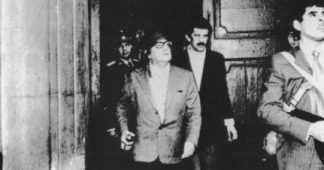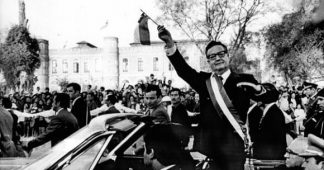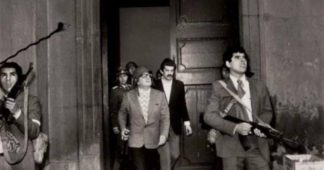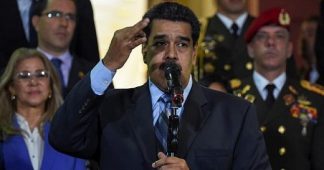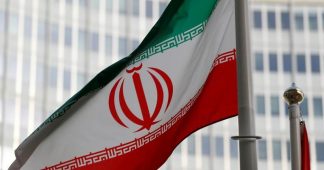WASHINGTON, Sept. 19 —The Central Intelligence Agency secretly financed striking labor unions and trade groups in Chile for more than 18 months before President Salvador Allende Gossens was overthrown, intelligence sources revealed today.
They said that the majority of more than $8‐million authorized for clandestine C.I.A. activities in Chile was used in 1972 and 1973 to provide strike benefits and other means of support for anti‐Allende strikers and workers.
William E, Colby, Director of Central Intelligence, had no comment when told of The Times’s information.
In testimony today before the Senate Foreign Relations Committee, Secretary of State Kissinger asserted that the intelligence agency’s involvement in Chile had beeen authorized solely to keep alive political parties and news media threatened by Mr. Allende’s minority Government. The clandestine activities, Mr. Kissinger said, were not aimed at subverting that Government.
Among those heavily subsidized, the sources said, were the organizers of a nationwide truck strike that lasted 26 days in the fall of 1972, seriously disrupting Chile’s economy and provoking the first of a series of labor crises for President Allende.
Direct subsidies, the sources said, also were provided for a strike of middle‐class shopkeepers and a taxi strike among others, that disrupted the capital city of Santiago in the summer of 1973, shortly before Mr. Allende was over thrown by a military coup.
At its peak, the 1973 strikes involved more than 250,000 truck drivers, shopkeepers and professionals who banded to gether in a middle‐class move ment that, many analysts have concluded, made a violent overthrow inevitable.
The Times’s sources, while readily, acknowledging the intelligence agency’s secret support for the middle classes, insisted that the Nixon Administration’s goal had not been to force an end to the Presidency of Mr. Allende.
The sources noted that a request from the truckers union for more C.I.A. financial aid in August, 1973, one month before the coup, was rejected by the 40 Committee, the intelligence review board headed by Secretary of State Kissinger.
Nonetheless, the sources also conceded that some agency funds inevitably—as one high official put it —“could have filtered” to the truckers union thereafter.
“If we give it to A, and then A gives it to B and C and D,” the official said, “in a sense it’s true that D got it but the question is—did we give it to A knowing that D would get it?”
The official added that it was “awfully hard” to maintain control over, local field operatives, particularly when large sums of cash were involved.
A number of sources also explained that the Central Intelligence Agency, by using the Chilean black market, was able to increase the basic buying power of the $7‐million estimated to have been spent on clandestine efforts between 1970 and 1973. The unofficial exchange rate, sources said, was as much as 800 per cent higher than the official rate, indicating that the C.I.A.’s cash could have had a local impact of more than $40‐million.
Informers Inside Parties
The sources depicted the general involvement of the intelligence agency with the labor unions and trade groups as part of a broad effort to infiltrate all areas of Chile’s govern
Mental and political life. The sources said that by the end of the Allende period, the agency had agents and informers in every major party making up Mr. Allende’s Popular Unity coalition.
One troubling failure during the latter part of Mr. Allende’s power, the sources said, was the agency’s inability to infiltrate the Movement of the Revolutionary Left, or the M.I.R., the major revolutionary group outside the Allende coalition.
At his news conference Monday night, President Ford de clared his support for the C.I.A. involvement in Chile and said that it had been authorized because “there was an effort being made by the Allende Government to destroy opposition news media, both the writing press as well as the electronic press, and to destroy opposition political parties.”
In fact, The Times’s sources agreed, less than half the money made available for clandestine activities in Chile was provided for the direct support of the allegedly threatened politicians, newspapers and radio‐television stations referred to by Mr. Ford.
Official Defends Activities
One official, with first‐hand knowledge of the decision‐making on Chile, strongly defended the intelligence agency’s involvement with trade unions and organized strikes.
“Of course, the agency tries to support the people who believe in its aim,” he said. “In the taxicab driver strike, our goal is to make sure that he [the driver on strike is not going to fold. The str ike money was used to supply subsistence for people who believed in what you do.”
“You’ve got to understand what was going on,” the official added.
“The intelligence reports coming to us were frightening. Allende would send Popular Unity representatives into a business and claim that the workers were complaining about high profits.”
“Then they’d take over the books and raise the taxes 50 per cent,” he said. “It was a very brutal policy.”
“So our idea was to prevent this from working and money was the way to go,” the official said. “What we really were doing was supporting a civilian resistance movement against an arbitrary Government. Our target was the middle‐class groups who were working against Allende.”
A ‘Marginal Input’
“The whole point of this is that covert action provides a 1 per cent impetus for something that the people want anyway,” he said. “In a civilized country; the C.I.A. can only make a marginal input. It takes a lot of money and—this is most important—you don’t do it unless you’re told to [by higher authority in Washington].”
Some financial support for newpaper and radio stations was needed in Chile, the official explained, because “it wouldn’t have been good to have strikes if nobody knows about it.”
Most of the funds invested for propaganda purposes, the official said, went to El Mercurio, the main opposition newspaper in Chile. “It was the only serious political force among the newspapers and television stations there,” he said.
“As long as you don’t make it sound like we were trying to start a coup, it’ll be all right,” the official added. “You’ve got to understand that he [Allende] was taxing them [the middle‐class] to death.”
The official noted that the policy toward Chile, authorized by the 40 Committee, had been the subject of intense debate in the Nixon Administration. One concern, he said, was that intervention would serve to polarize further the classes in Chile. “And if Allende decided to bear down and destroy the middle class,” the official added, “some of us thought it might result in dictatorship of the left or the right—and that wasn’t such a good idea.”
The official described the Administration’s policy in Chile as a failure. “We were not looking for a military takeover,” he declared.
A different opinion about the ultimate goals of the Administration’s policy was provided in an interview by a source who served a number of years in Chile.
“The people within the Emhassy,” the sources said, “felt that they were engaged in a kind of warfare, the people either were with you or against you when it came to Allende.”
Professor Described Offer
“There were a lot of people lit Santiago on the far right who were essentially dedicating their lives to the‐overthrow of Allende—it was like a holy war,” the source said. “These people were increasingly seen at the embassy in 1972 and 1973.”
At the time, he added, “just putting some resources at their disposal alone would be enough.”
In testimony Monday before la House subcommittee investisating the activities in Chile, Richard R. Fagen, a professor who did reseach in Chile in 1972 and 1973, said he had been approached by an American Embassy official in Santiago and urged to aid in covert gathering of information on leftwing groups.
Mr. Fagen, who teaches political science at Stanford University, testified that the request had been coupled with an offer to help him exchange personal money “through the black market channels used by the embassy.”
All of the sources interviewed by The Times insisted that the policies regarding the clandestine financing of trade groups and unions had been established and approved by the 40 Committee.
Edward M. Korry and Nathaniel M. Davis, successive ambassadors to Chile during the. Allende regime, frequently reported to Mr. Kissinger, then former President Nixon’s national security adviser, through confidential channels, the sources said. Reports with less sensitive information were forwarded through the normal State. Department channels to Washington, the sources said.
They added that most, if not all, of the C.I.A.’s direct strike subsidies for unions and trade groups were initiated in 1972, after Mr. Davis, a specialist on Eastern Europe, was assigned as Ambassador.
A number of sources further told The Times that Mr. Colby, contrary to many published accounts, had fully briefed two Congressional subcommittees about the intelligence agency’s financing of union and trade groups during the Allende regime.
During those briefings, which were before the Senate Foreign Affairs Subcommittee on Western Hemisphere Affairs and the House Armed Services Subcommittee on Intelligence, Mr. Colby sought to emphasize, the sources said, that the C.I.A. began to pull back on its clandestine commitments in Chile late in the spring of 1973, when there were almost weekly reports of an impending coup.
Link to Military Severed
At one point in the spring, the sources said, the agency did formally break its direct relations with the Chilean military, which was known to be plotting against President Allende. Although direct contact was eliminated, the sources said, the agency continued to maintain a liaison role for intelligence purposes.
There was concern in the C.I.A. a reliable source said, about “getting involved with people who were shorter‐term people than we were.”
“Our goals were longer term,” he said, in an allusion to the official Ford Administration position now that the agency’s objective had, been to prevent the possible establishment of one‐party Government by Mr. Allende.
Questions about the United States’ clandestine role in promoting the 1973 truck strike have repeatedly been raised by supporters of President Allende, who lost his life in the coup.
In an interview in Mexico City last year, Mr. Allende’s widow, Hortensia Bussi de Allende, charged that the United States “had a great responsibility in what happened.”
She asserted that the truck strike, which involved abotrt 50,000 Workers, had been financed by American money. “What were they living on if they were not working?” she asked. “They had to be financed from outside.”
In August, 1973, a newspaper in Santiago, Ultima Hora, accused the United States of having financed both the truck strike in the fall of 1972 and a strike then in progress. Mr. Davis, then the Ambassador, refused to comment.
After the coup, the State Department formally denied any financial involvement in the 1973 truck strike or the other work stoppages and protests in Chile, declaring that “such suggestions are absurd.”
Jack. B. Kubisch, then Assistant Secretary of State for Inter‐American Affairs, refused to answer in public when queried about such financing during a House hearing after the Allende coup.
Published at www.nytimes.com
We remind our readers that publication of articles on our site does not mean that we agree with what is written. Our policy is to publish anything which we consider of interest, so as to assist our readers in forming their opinions. Sometimes we even publish articles with which we totally disagree, since we believe it is important for our readers to be informed on as wide a spectrum of views as possible.
